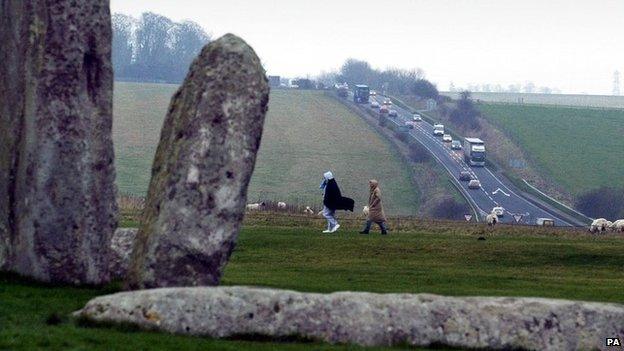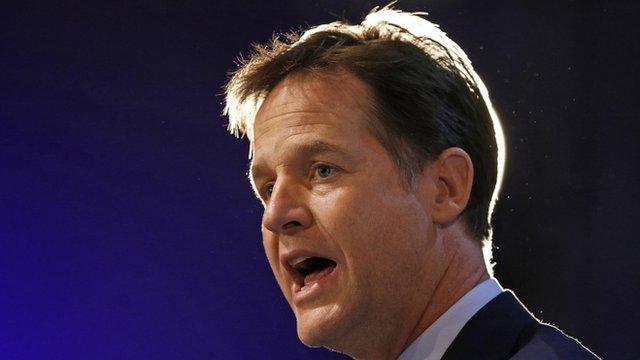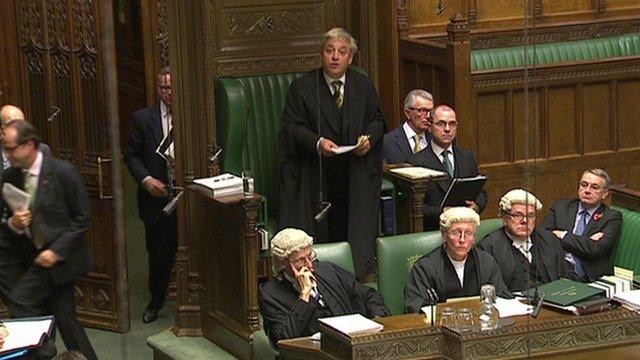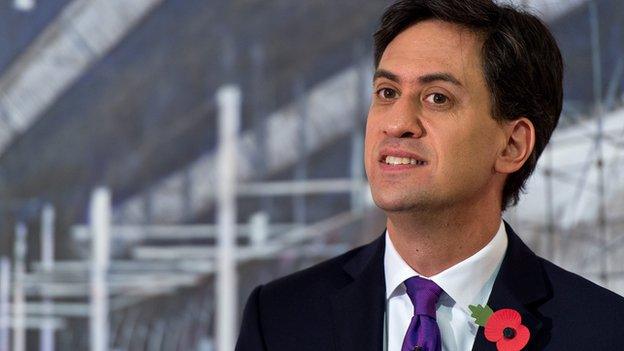EU referendum will not damage economy - David Cameron
- Published
- comments
David Cameron: "Simply standing here and just saying 'I will stay in Europe...' that is not a strategy"
David Cameron has rejected claims an EU referendum will damage the UK economy, criticising those who argue the UK should stay in the EU "come what may".
The prime minister told the CBI conference the UK was securing more inward investment than the whole of the EU despite his 2017 referendum pledge.
He also said he would toughen migration controls, despite business concerns.
At the same event Labour's Ed Miliband said it was "dead wrong" to think the UK would be better off outside the EU.
Meanwhile, Deputy Prime Minister Nick Clegg warned that the UK would have "no future" outside the European Union.
With a general election six months away, the three leaders of the largest Westminster parties have been seeking to reassure business leaders that their views on an EU referendum are in the UK's national and economic interest.
Businesses have warned that the prospect of a referendum is causing uncertainty and could deter them from looking to expand or hire new workers.
'Extraordinary investment'
But Mr Cameron rejected claims that a referendum would destabilise the economic recovery, suggesting there were months when the UK was securing more inward investment than the whole of the EU combined despite the warnings about its future membership.
"If there has been uncertainty, why is it that there has been such an extraordinary period of investment into our country?" he asked the conference.

Mr Cameron pledged upgrades to the A303 and other "pinch points" on the roads
He added: "The worst thing for us to do as a country is to pretend that this European debate is not happening. The best thing is to get out there and make the arguments."
He added: "Simply standing here and saying, 'I will stay in Europe, I will stick with whatever we have, come what may' is not a plan. It is not a strategy, it will not work."
He insisted he wanted the UK to stay within a reformed EU, one based on a "common market and co-operation, not an ever-closer union".
"Britain's future in Europe matters to the country," he said. "It is not working properly... and that is why we need to make changes."
CBI director general John Cridland said he welcomed David Cameron's "endorsement" of the business group's "In with Reform" European strategy.
Nick Clegg: "We are nothing if we are not an open, vibrant economy"
During his speech, Mr Cameron said the government's economic strategy was working and the UK should "stick with it", although he acknowledged the deficit was still too high.
He pledged a £15bn revolution for the UK's road network, with 100 major motorway and trunk road upgrades by 2020 to tackle "pinch points and problem areas".
'Open society'
Also speaking at the conference, Deputy Prime Minister Nick Clegg urged people to look beyond "spats" over individual EU directives and focus on the wider benefits that the UK derived from being in the EU.
"We have always been a great trading nation and an open society... there is simply no future for you all, your country if we turn our backs on the world and try and pull up the drawbridge, if we try and wish away the world around us."
Ed Miliband: "There is no future for Britain turning inwards"
Labour leader Mr Miliband accused the prime minister of making promises he could not keep on the EU and immigration, saying his response to the recent EU budget row had been to "bang the table one day and pay up the next".
"Giving succour to the argument that the real answer is leaving the EU, or contemplating it, simply drags us closer to exit," he said.
"And every nod and wink to those who want to leave sends a message to potential investors in our country that we are not open for business.
"If I am prime minister I will never risk your businesses, British jobs, British prosperity by playing political games with our membership of the European Union."
Mr Miliband said the current economic recovery was "joyless" and a future Labour government's "pro-business agenda" would put the interests of working people first.
'Based on facts'
Business leaders are seeking assurances from the party leaders about their plans to curb immigration from both inside and outside the EU.
CBI president Sir Mike Rake rejected claims the country faced an "either/or choice" between immigration and a more skilled UK workforce, saying the UK would need skilled foreign workers "for some time to come".
"Immigration has been and is part of the solution to the skills shortages faced by the UK but it is clear that there is a disconnect between the experiences of businesses and the public at large," he told the conference.
"In some areas, concerns about immigration have become a substitute for frustrations with living standards," he said.
"Business has a vital role to play in ensuring the debate is based on the facts whilst recognising the genuine concerns of the public around immigration."
'Undemocratic'
Mr Cameron said the UK needed proper immigration controls but said further curbs would not deliver benefits without accompanying welfare, education and skills reforms.
His comments come as Home Secretary Theresa May described the Conservatives' pledge in opposition to cut net migration to below 100,000 a year by 2015 as a "comment" rather than a promise.
Net migration - the difference between the number of people coming into the UK and those leaving - rose by 38% to 242,000 in the 12 months to March 2014.
Downing Street said there had been "no change whatsoever" in David Cameron's desire to get net migration down to the tens of thousands by next year.
Former Conservative minister Greg Barker told the BBC's Daily Politics that it would be "incredibly challenging" to hit this target, although it was still the party's aim.
The UK Independence Party, which wants the UK to withdraw from the EU, questioned the CBI's judgements, saying it had been a cheerleader for joining the euro in the 1990s.
"It wants to lock Britain into an undemocratic European superstate that uses excessive regulation as a way of keeping small and medium-sized companies from breaking into a cosy corporate cartel," said MEP Patrick O'Flynn.
- Published10 November 2014

- Published10 November 2014

- Published11 November 2014

- Published9 November 2014
